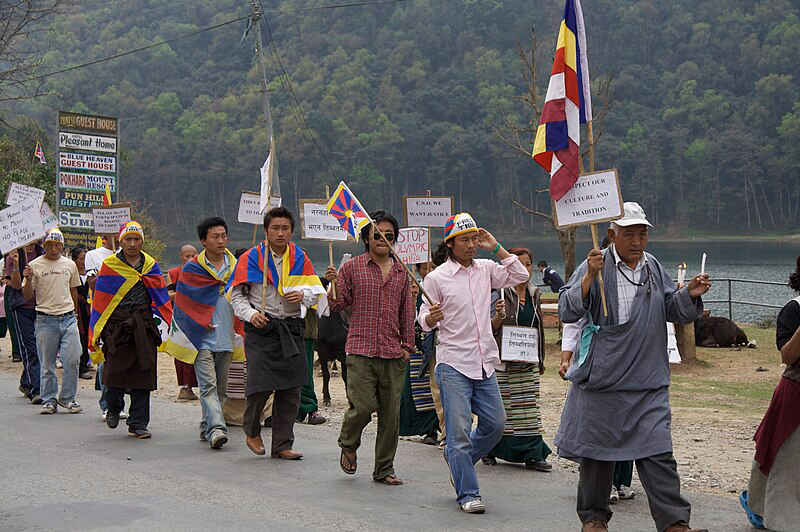 Nepal
Nepal
China's economic and political ties with Nepal affecting lives of Tibetan refugee community
Kathmandu/IBNS: China's growing influence in Nepal is no longer just a geopolitical concern; it has evolved into a critical human rights issue, directly impacting the Tibetan refugee community, according to an article published on online magazine Bitter Winter.
Writer of the article Tsering Passang, who is the founder and Chair of Global Alliance for Tibet and Persecuted Minorities, said he spent a month in Nepal over the past summer, visiting Tibetan refugee camps, where he witnessed the intensifying struggles these refugees face as China's presence in the country becomes stronger.
The situation goes beyond economic development—it's a story of increasing repression, echoing the very circumstances that forced Tibetans to flee their homeland more than 65 years ago, Passang shared his experience.
One of the most visible signs of China's involvement in Nepal is the rapid transformation of the country's infrastructure.
From the introduction of Chinese-funded electric buses to the construction of airports in Lumbini and Pokhara, China's projects are reshaping the landscape and shifting public perception of China.
However, these economic developments come at a cost: the erosion of Nepal's sovereignty.
For years, Nepal has walked a fine line between India and China, maintaining a delicate balance in its foreign relations.
Yet, with an increasing number of Chinese-backed projects, concerns are growing about Nepal's long-term independence.
Despite the creation of new airports, foreign airlines remain cautious about using them, largely due to India's concerns about China's expanding role in Nepal's internal affairs.
As Nepal becomes more dependent on Chinese investments, its foreign policy risks tilting in Beijing's favor, potentially undermining its autonomy.
This shift in Nepal's geopolitical stance has even graver consequences for the 10,000 Tibetan refugees still living in exile in the country.
Having fled persecution and cultural suppression in Tibet after China’s occupation, many Tibetans are now confronting similar restrictions in Nepal, where they had hoped to find safety, according to the article.
Expressions of Tibetan identity—whether through wearing a "Free Tibet" t-shirt, raising the Tibetan flag, or practicing traditional customs—are increasingly met with resistance.
Passang said that during his visit, he learned that local authorities, possibly under Chinese pressure, have begun restricting Tibetan cultural practices.
Events like Gorshey, once a public celebration of Tibetan heritage, are now forced underground in the Kathmandu Valley, he said, adding that the suppression of these cultural activities is a painful reminder of the repression Tibetans believed they had escaped.
Even the symbolic tradition of Lhakar (White Wednesday) is now in jeopardy.
This weekly movement, which began after the 2008 protests in Tibet, allows Tibetans to express pride in their identity by speaking their language, wearing traditional clothing, and supporting Tibetan-owned businesses.
Yet even these peaceful acts of cultural resistance are being stifled.
As China's influence deepens in Nepal, Tibetans are finding it harder to gather and celebrate their traditions without fear of reprisal, the article read.
What is particularly distressing is that the very freedoms Tibetan refugees sought in exile—freedom of expression, freedom from fear, and the preservation of their identity—are being stripped away.
The parallels between the repression they fled in Tibet and the growing pressure they now face in Nepal are becoming alarmingly clear.
This mounting threat to the rights of Tibetan refugees must be addressed on the global stage.
"The international community cannot remain silent. China's expanding role in Nepal is not just about infrastructure—it's about human rights and cultural survival," Passang wrote in the article.
"Tibetan refugees deserve the right to express their cultural identity without fear of persecution or interference," he added.
"Now is the time for action. Media outlets, human rights organizations, and governments worldwide must bring attention to this urgent issue," Passang mentioned.
"As China continues to reshape Nepal’s political and social landscape, the global community has a responsibility to ensure that Tibetans in exile can live free from oppression and preserve their cultural heritage," he added. "Their struggle is not just about one displaced community—it is a fight for universal values like freedom, dignity, and the right to exist as a people."
"The struggle for Tibetan freedom continues," Passang noted.
He also urged the international community to stand with the Tibetan refugees in Nepal and recognize the growing threat of China's influence.
"Defending their cultural identity and their right to live free from oppression is a fight for the fundamental human rights we all hold dear," Passang wrote in the article.
Support Our Journalism
We cannot do without you.. your contribution supports unbiased journalism
IBNS is not driven by any ism- not wokeism, not racism, not skewed secularism, not hyper right-wing or left liberal ideals, nor by any hardline religious beliefs or hyper nationalism. We want to serve you good old objective news, as they are. We do not judge or preach. We let people decide for themselves. We only try to present factual and well-sourced news.





